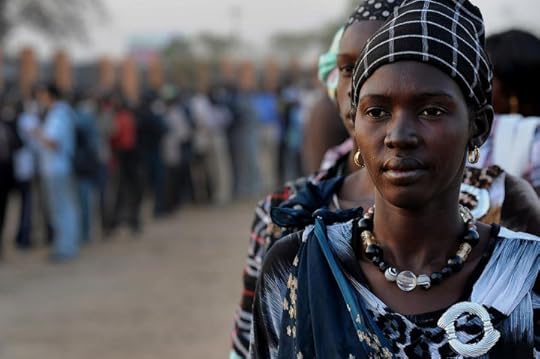Democracy by numbers

Image credit Tim McKulka via UN Photo Flickr (CC).
A��key political trend of the past three decades is��the spread of��formal democracy��through the global South.��This posed a challenge to mainstream academics and commentators in the North��who were used to thinking of��democracy as the��property��of the white-run countries of Western Europe and North America. Since the 19th��century, when��John William Burgess,��the American credited with founding academic political science,��insisted that��only��the “Teutonic” races (white Anglo Saxons) had a gift for�����liberty,�����democracy had become code for�����run by civilized white people.�����Later, the revered US scholar Seymour Martin��Lipset��offered a liberal version of Burgess���s view by insisting that only countries which embraced market economics and�����western��culture�����could��be democratic.
On one level, democracy���s spread��could be seen as a triumph of��western��civilization���many mainstream academics��were pleased that everyone was now embracing the ways of the West. But it was also a problem because democracy isn���t a��western��preserve at all.
In my new book,��Power in Action: Democracy, Citizenship and Social Justice, I argue that the democratic idea is that every adult has a right to an equal say in all decisions��that��affect them. Democracy is established and sustained not by white missionaries but by collective action. It is born, and grows, when people who have been excluded from decision-making are able to��organize,��to force themselves into the conversation.��That does not necessarily mean taking to the streets, although it might���the most��effective��collective action, the��sort��almost always used by the powerful,��is the�����routine�����kind,��such as belonging to associations��that��influence policy.��But it does mean gaining an organized collective voice.
So the��problem��for the��northern��colonizer��of the mind��is that��democracy��may be used not to affirm their values, but to reject them.��It was no done deal that the new democracies��of the South would��become��western��democracies which, in their view, are the only��real��ones, to which all others should aspire.��This worry created a body of academic writing���the��democratic consolidation��approach,��which��examined��whether new democracies were��consolidated���meaning��whether they resembled a romanticized version of democracies��in��the North.
This��approach also created the democracy��scoring��index which gave��scientific��credibility to the��consolidation��approach by ranking democracies and then assigning��them��a numerical score or a ranking��in��an index.��The US-based��Freedom��House��is the best-known: it��ranks all countries as��free,��partially free��or not free; the��UK-based Economist Intelligence Unit ranks countries as��authoritarian,��hybrid,��flawed democracies��and��full democracies.
Democracy by numbers gives great power to the colonial��assumptions of the��consolidation��approach.��Academics��who��prefer the mathematics of regression analysis to rational thought (which today, in the North, means most) can feed the Freedom House scores or those of the��other indexes��into computer programs��and make sweeping claims about democracy throughout the world.��The scores are��also��handy references for journalists or social media debaters. And so they come to play a crucial role in the way democracy is seen.
Like all colonial assumptions, the democracy by numbers business says more about the prejudices of those who compile��the indices��than the state of the world.��Freedom House always gives��northern��countries a score of 1, which means��free��(even when they detain people without trial or gerrymander elections). The Economist allows the odd southern country to become a��full democracy,��but��generally populates��this club��with��northern��countries despite the fact that there is no evidence that their democracies are more��real��than those of the South.
Although��the numbers give a false sense of authority, they are based on opinions, not an��objective��measure;��if you put numbers to opinions, they are still��opinions. And, since the opinions are those��of mainstream���northern scholars or others who think��like��them���the effect is to turn the latter-day versions of Burgess and��Lipset���s��prejudices into the way many people with great influence see the world.
Next time someone tries to make or clinch an argument with a democracy index, remember the prejudices��that��lie behind the numbers.
Sean Jacobs's Blog
- Sean Jacobs's profile
- 4 followers



